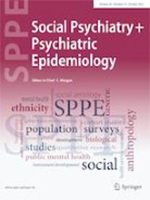Publications
Dr. Trenette’s research has been published in over 70 peer-reviewed journal articles over the past decade. Explore some of the highlights below.
Featured Publications:

Goings, T.C., Salas-Wright, C.P., Legette, K., Belgrave, F.Z., & Vaughn, M.G. (in press). Far from a monolith: A typology of externalizing behavior among African American youth. Social Psychiatry and Psychiatric Epidemiology.
Published online: August 11, 2021
Abstract
Purpose
Previous studies have examined externalizing behaviors among African American youth using variable-centered approaches that study aggression and delinquency separately. However, aggression and delinquency often operate together in shaping adolescent behavior. For this reason, person-centered approaches are essential for identifying subgroups of African American youth using multiple indicators of aggression and delinquency to model the behavioral heterogeneity within this population. We examined the relationship between interpersonal, school, and parenting factors and externalizing behaviors among African American youth.
Method
Drawing from the National Survey on Drug Use and Health 2015–2018, we conducted latent class analysis based on 5 externalizing behavior indicator variables (i.e., serious fight, attack to harm, stealing, drug selling, handgun carrying) using a sample of 7,236 African American adolescents, aged 12–17.
Results
We identified a three class solution: Class #1—No Involvement (74.4%), characterized by very low levels of involvement in all of the externalizing behaviors examined; Class #2—Serious fight (23.3%), which is characterized by near-universal involvement in a serious fight, far lower levels of attack to harm, and negligible levels of stealing, drug selling, and handgun caring; and Class #3—Multidimensional externalizing (2.3%), characterized by very high levels of involvement in all of the externalizing variables examined.
Conclusions
Most African American youth are not involved in externalizing behaviors. It is vital to support both the large majority of African-American youth who are abstaining from externalizing behaviors and to develop/implement programs to address the contextual and interpersonal needs of youth at elevated risk for consequences related to externalizing.

Goings, T.C., Yu, T., & Brody, G. (in press). Contextual risks and psychosocial outcomes among rural African American emerging adults: A latent profile analysis. Development and Psychopathology.
Published online by Cambridge University Press: December 23, 2020
Abstract
African American emerging adults face unique contextual risks that place them at heightened risk for poor psychosocial outcomes. The purpose of this study was to identify profiles of contextual risks among rural African American emerging adults and determine how risk profiles relate to psychosocial outcomes. Our representative sample included 667 fifth graders who live in the rural South and were followed from preadolescence into emerging adulthood. Contextual risks were assessed at ages 19–21 years via six indicators: perceived stress, daily stress, community disadvantage, parent–child conflict, racial discrimination, and childhood trauma. Four psychosocial variables were also assessed at ages 19–21 years: self-regulation, racial identity, parent support, and friend support. Psychosocial outcomes were assessed at age 25 years: education, substance use, future orientation, depressive symptoms, and externalizing behaviors. Latent profile analysis results indicated that the sample could be characterized by three patterns of contextual risk: low contextual risk, high contextual risk, and high contextual risk–childhood trauma. Risk profiles were associated with psychosocial outcomes, with the childhood trauma and high-risk profiles faring worse than the low-risk profile. Further, childhood trauma was particularly predictive of worse outcomes for emerging adults. Findings highlight the need for research and prevention programs that mitigate the effects of contextual risks on psychosocial outcomes for African American emerging adults in rural areas.

Clark, T.T., Salas-Wright, C., Vaughn, M., & Whitfield, K. (2015). Everyday discrimination and mood and substance use disorders: A latent profile analysis with African Americans and Caribbean Blacks. Addictive Behaviors, 40, 119-125. doi:10.1016/j.addbeh.2014.08.
Published online by Addictive Behaviors: Volume 40, January 2015
Abstract
Background
Perceived discrimination is a major source of health-related stress. The purpose of this study was to model the heterogeneity of everyday-discrimination experiences among African American and Caribbean Blacks and to identify differences in the prevalence of mood and substance use outcomes, including generalized anxiety disorder, major depressive disorder, alcohol-use disorder, and illicit drug-use disorder among the identified subgroups.
Method
The study uses data from the National Survey of American Life obtained from a sample of African American and Caribbean Black respondents (N = 4,462) between 18 and 65 years. Results: We used latent profile analysis and multinomial regression analyses to identify and validate latent subgroups and test hypotheses, yielding 4 classes of perceived everyday discrimination: Low Discrimination, Disrespect and Condescension, General Discrimination, and Chronic Discrimination. Findings show significant differences exist between the Low Discrimination and General Discrimination classes for major depressive disorder, alcohol-use disorder, and illicit drug-use disorder. Moreover, we find significant differences exist between the Low Discrimination and Chronic Discrimination classes for the four disorders examined. Compared with the Chronic Discrimination class, members of the other classes were significantly less likely to meet criteria for generalized anxiety disorder, major depressive disorder, alcohol-use disorder, and illicit drug-use disorder.
Conclusions
Findings suggest elevated levels of discrimination increase risk for mood and substance-use disorders. Importantly, results suggest the prevalence of mood and substance-use disorders is a function of the type and frequency of discrimination that individuals experience.

Clark, T.T. (2014). Perceived discrimination, depressive symptoms, and substance use in young adulthood. Addictive Behaviors, 39, 1021-1025. doi:10.1016/j.addbeh.2014.01.
Published online by Addictive Behaviors: Volume 39, Issue 6, June 2014
Abstract
Perceived discrimination is an important health-related stressor. As suggested by the stress-coping model, substance use often serves as a means to reduce the negative effects of perceived discrimination. This study uses data from the National Survey of American Life—Adults to examine the structural relationship of perceived discrimination and depressive symptoms with lifetime and recent substance use among African American and African Caribbean young adults. Respondents (N = 1910) were 18–35 years old. Compared with African Caribbeans, African Americans report significantly higher levels of depressive symptoms and both lifetime and recent substance use. Multiple-group structural equation modeling is used to evaluate model fit and test hypothesized models. Results show good fit of the hypothesized models in both African Americans and African Caribbeans. Full measurement and structural invariance is found across ethnicity. Mediation models explain 18.5% and 47.4% of the variance in lifetime substance use for African Americans and African Caribbeans, respectively, and 23.5% and 35.0% of the variance in recent substance use for African Americans and African Caribbeans, respectively. Mediation tests indicate depressive symptoms partially mediate the relationship between perceived discrimination and lifetime substance use and fully mediated this relationship for recent substance use. This study is the first to demonstrate a positive association between perceived racial discrimination and substance use among African Caribbean young adults. Study findings illuminate the influence of perceived discrimination on substance use and the mechanisms of this relationship among African American and African Caribbean young adults.

